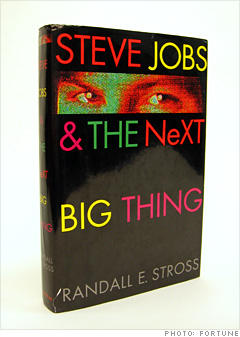With all the discussion of the New York Times’s bizarre decision to run a column that states as received wisdom that the iPhone’s poor network performance in the United States is Apple’s fault and not AT&T’s, surprisingly little attention has been paid to the track record of reporter Randall Stross with regard to Steve Jobs.
So I visited his website, and I remembered where I’d seen his name — on the cover of a book I read in high school that made a tech prognosis so spectacularly wrong that it’s occasionally used as a case study against proclaiming whether a particular technology is a winner or loser. That book? Steve Jobs and the NeXT Big Thing. And its central premise was that Steve would never produce another tech industry hit. Seriously.
This post contains affiliate links. Cult of Mac may earn a commission when you use our links to buy items.
And, even in early 1997, it was clear that the author had underestimated the abilities of the man who made “One More Thing” a household phrase. Among Stross’s evidence that Jobs had gotten lucky by hitching his star to Woz (yes, really)? The iCEO had purchased some “computer animation” company called Pixar that made interesting cartoons but would never make any money — which was already demonstrably false just four years later. Another particularly memorable chapter chronicles in great detail about how if Steve Jobs were more like Scott McNealy of Sun Microsystems, he might some day be able to reascend the pinacle of the computer industry. He even went so far as to proclaim the “low-cost” SparcStation from Sun a clear example of how Steve could have avoided making an over-priced machine like the NeXT Cube — while carefully omitting the fact that the Sun machine cost more than the Cube.
Now, no one in 1993 could have possibly imagined that Pixar would one day eclipse Disney as a family entertainment brand (other than John Lasseter and Ed Catmull, of course) or that Steve would change Apple into the market leader in digital music, a transformative force in mobile phones, and a profit leader in computers. But it takes a singularly myopic force to declare that Steve is “imprisoned… by his selective historical memory.” Actually, Steve is freed by his selective memory. He manages to forget bad stuff as soon as it happens and just get on to the next great thing. It’s his secret to success. Steve, unlike some who write about him, is always thinking about the future of a technology instead of trying to dissect what’s happening today.


